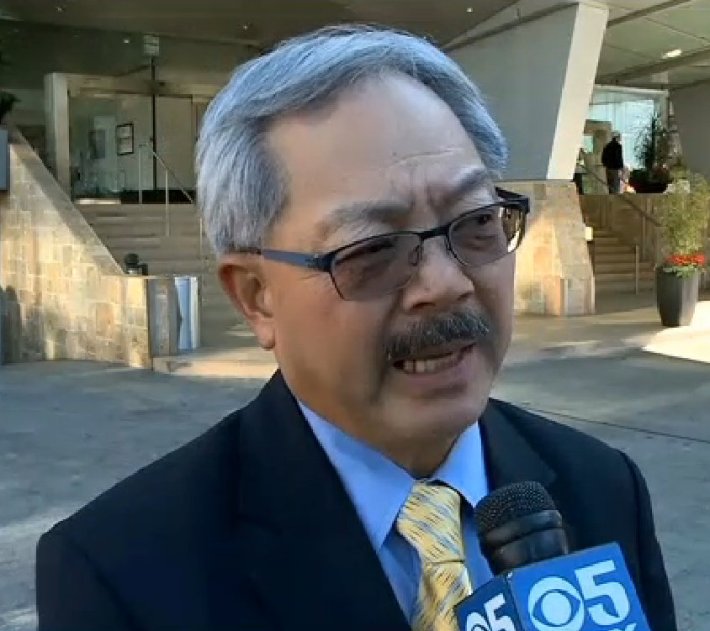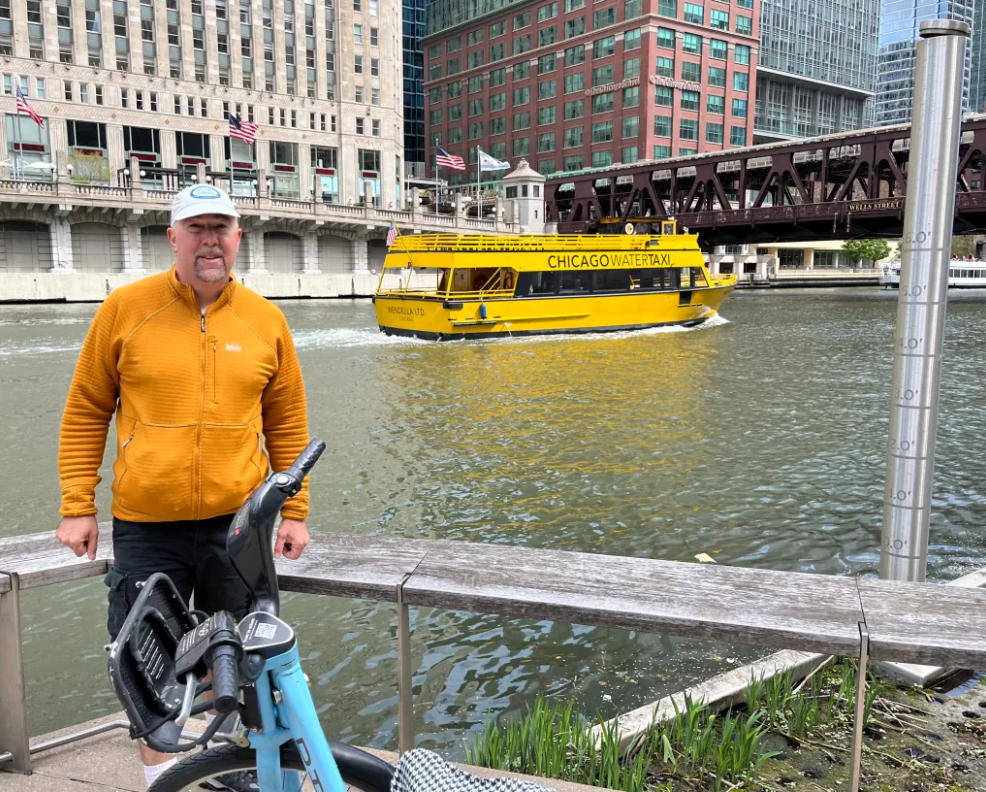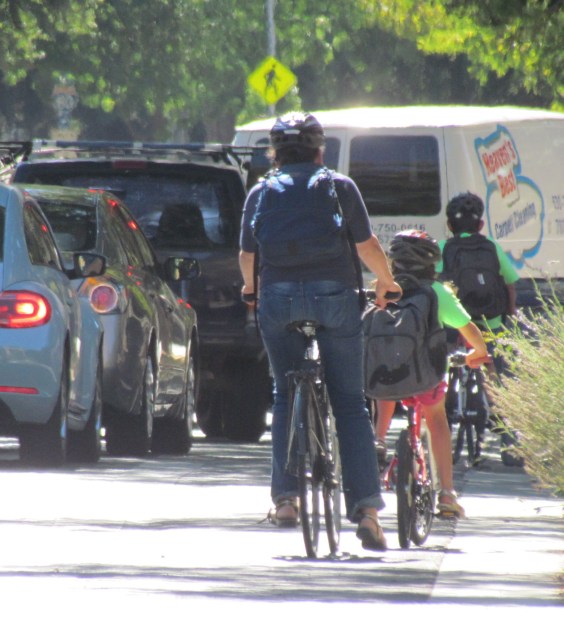Mayor Lee’s Spineless Sunday Meter Reversal: Bad for Business, Bad for SF
4:54 PM PST on January 16, 2014
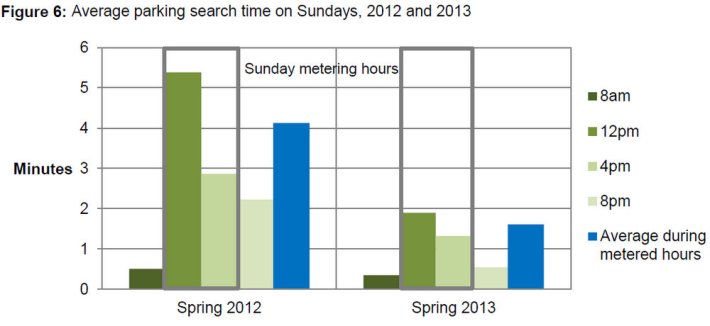
After a years-long push to implement a smart parking policy in San Francisco, leave it to Mayor Ed Lee to take us back to 1947.
The mayor wants to repeal parking metering on Sundays, undoing the slew of benefits that the policy has brought to the city in its first year. As a recent SFMTA report lays out, Sunday metering has increased turnover for businesses and reduced car traffic circling for parking in commercial areas. Previously, meter hours hadn't been updated since 1947, when businesses generally weren't open on Sundays.
By pandering to drivers complaining about parking tickets, the mayor appears to be betting he'll win support for three transportation funding measures expected to hit the ballot in November. But reinstating free parking would come at incredible cost in the form of extra car traffic, while undermining the SFMTA's ability to implement rational transportation policy.
Lee's absurd argument is that SF doesn't need Sunday metering because Muni will have sufficient funding once voters approve the ballot measures. It's an insult to the transit-riding public, and it shows how out of touch he is with the city's transportation needs. Explaining why he didn't stand in the way of Sunday metering when it was adopted, he told the SF Chronicle this week, "I've always felt uncomfortable with it, but Muni was suffering and we needed the money," as if parking meters serve no purpose other than revenue collection.
Yet the Chamber of Commerce backed Sunday metering -- and it still does, because it's good for business, said Jim Lazarus, senior vice president for public policy. "In most commercial corridors, virtually every business is open on Sunday," he said. Without metering, "There are neighborhoods where it's difficult, if you have to drive to do any business, because parking is just not available from Saturday night until Monday morning."
"Sadly, it looks as though the Mayor is playing political games instead of responsibly managing the city's transportation system," said Livable City Executive Director Tom Radulovich. "Aside from the revenue hit to Muni, what's disappointing about the mayor's move is that the facts show that Sunday metering was working - parking availability and turnover increased in commercial districts, which is helpful to merchants and shoppers."
"Improved parking availability reduces cruising for parking, which in turn reduces danger to pedestrians and cyclists, traffic congestion in neighborhoods, air pollution, and greenhouse gas emissions."
The benefits were demonstrated in a December SFMTA report [PDF] on the impacts of Sunday metering in 2013:
- The average time drivers took to find a parking spot during Sunday meter hours was cut in half, from four minutes to less than two.
- Turnover increased by at least 20 percent, meaning that more customers were using the same amount of parking spaces.
- The average availability of parking on Sunday doubled during metered hours, increasing from 15 to 31 percent.
- The city's underutilized parking garages are being used more: Garage occupancy on Sundays from 12pm to 6pm increased by 13 percent.
Meanwhile, Mayor Lee claims that the city still receives a litany of complaints about Sunday meters, and he hopes to appease those folks. But as of September 2013, the city's 311 service had received just 23 calls and emails complaining about Sunday metering, according to the SFMTA report.
Regardless of whether the mayor's anti-meter mob is real, reversing great policy to appease complainers is a terrible idea. Using the stats in the SFMTA report, the mayor's position could be framed another way. Mayor Lee wants to:
- Double the average time drivers take to find a commercial parking spot on Sundays.
- Reduce turnover by at least 20 percent, meaning that fewer customers can park in each space.
- Cut the availability of commercial parking during Sunday business hours in half.
- Reduce occupancy of underutilized parking garages on Sundays by 13 percent.
Additionally, by arguing that we can do without Sunday meter revenue because voters will be asked to approve transportation funding measures (for capital improvements, not Muni operations), Lee is basically saying he wants San Francisco taxpayers to bankroll free parking on Sundays.
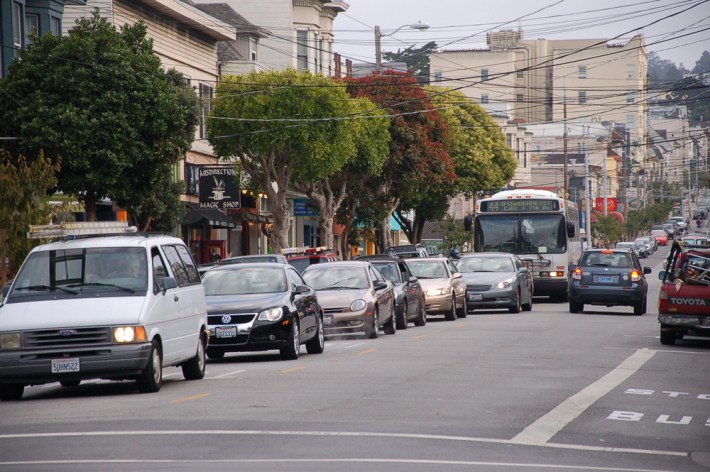
"Announcing the cancellation of a successful parking management program, and the revenue it generates, dents the mayor's credibility on transportation management and financing," said Radulovich. "He can't reasonably argue that Muni needs additional funding, but doesn't need all the revenue it is currently receiving."
Even accepting the argument that Muni doesn't need this revenue, other purported goals of the mayor -- like infrastructure for safe biking and walking -- could definitely use it. "Ironically, the Mayor suggested ending the Sunday parking meter program because the revenue is not needed, while, at the same time, his team claims funding is not available to act more decisively for on-street safety improvements," the SF Bicycle Coalition pointed out in a blog post today. “Where is the urgency? Where is the commitment to use the power of the mayor’s office to make the streets of San Francisco less deadly for our sons and daughters and grandparents and friends?”
Of course, revenue is not the main reason for parking meters -- management of parking demand is, even if that fact is ignored by Mayor Lee and the media outlets that are reporting on his free parking campaign.
But the revenue does provide much-needed funds to improve Muni, walking, and biking. The ballot measures recommended by the mayor's T2030 Task Force, which would boost general transportation funding with a general obligation bond, a sales tax increase, and a vehicle license fee increase, "are not to replace revenue streams, it's to enhance and supplement them," said Jason Henderson, author of "Street Fight: The Politics of Mobility in San Francisco," who called Lee's move a "cynical, political maneuver."
"It's genius, what Ed Lee's done," he said. "He's daring a progressive to defend Sunday parking meters."
As Radulovich noted, "This move demonstrates that SFMTA's governance model, which was intended to protect against crass tampering with transportation decision-making by politicians seeking short-term political gain, isn't working as it was supposed to."
If Mayor Lee simply wanted to reduce the pain of parking tickets, there's a much less damaging way to do it. The SFMTA's widely-lauded SFpark program, and the expansion of meters that accept multiple forms of payment, have led to steep declines in citations. On Sundays, parking citations have already declined slowly but steadily throughout 2013 as drivers adjusted to the new system, according to the SFMTA report.
The repeal of Sunday parking meters would need approval by the SFMTA Board of Directors, which Mayor Lee appoints members to. Lee already has Tom Nolan, the board's chair, on board. SFMTA spokesperson Paul Rose told the SF Bay Guardian that the agency is "willing to partner with the mayor to address affordability." Yes, the SFMTA is apparently considering abandoning its entire policy basis for parking management by re-framing free parking as an "affordability" issue. (It might work, if the added traffic and double parking makes SF a less desirable place to live.)
Of course, it's no surprise that the SF Interfaith Council, which fought fiercely to keep parking free on Sundays on behalf of churches, are lauding the mayor's push. An SFIC message sent to its members said it "reflects thoughtful appreciation for the broad, adverse impact of this policy."
Mayor Lee is expected to elaborate on his position at his "State of the City" address tomorrow.
Stay in touch
Sign up for our free newsletter
More from Streetsblog San Francisco
Streetsblog SF editor Roger Rudick offers constructive criticism of Chicago’s downtown bike network
"There were blocks that felt very safe and very secure," he said. "But then you're immediately – voom! – disgorged into three lanes of moving traffic with no protection."
Commentary: There is Zero Ambiguity to the West Portal Tragedy
What happened in West Portal was entirely predictable and preventable. The city must now close Ulloa to through traffic and make sure it can never happen again
